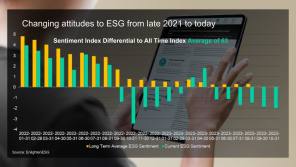

This time last year, the rise of environmental, social and governance considerations appeared to have reached a new peak.
A PwC survey of more than 1,000 investment professionals revealed that 77 per cent of institutional investors plan to stop buying non-ESG products by 2022.
It also reported that in Europe alone, ESG funds were expected to exceed conventional funds by 2025.
So, one year on, how far has the ESG investment journey continued in this direction? Will all funds be ESG funds in future, and what will the impact be on investors and companies?
Keith Churchouse, chartered financial planner at Chapters Financial, says he is not convinced by the timescales in the survey: “The direction of travel is certainly more positive for ESG funds, but I think it will take longer than 2025 for them to outnumber conventional funds.
"They are not yet becoming the norm."
And according to Churchouse, clients are not overwhelmingly voting with their feet, so far anyway, as he explains: “We have noted that in our experience, many investors are keen only to allocate a proportion of their funds to ESG investing, almost like a ‘try before you buy’ approach.
"Confidence will need to build with investors, and this will take time.”
Covid-19 has inevitably had an impact on clients’ decisions too, Churchouse notes. "Post-pandemic, many clients are just taking stock of where they are and where they want to be."
What does ‘green’ mean?
However, any hesitancy around ESG investment on the part of clients is not a reflection on the quality of the product, as Churchouse explains: “To be clear, there are some good ESG-focused investment funds available, and these are fully accessible.
“However, the maturity of this market, when the possibility of greenwashing should be minimal, may be some time away.”
Duncan Glassey, founder and chartered financial planner at WealthFlow, also expresses concerns about the issue of greenwashing: “Greenwashing is a major problem and likely to impact negatively in the minds of clients who will see through the marketing hype and untruths.
“There are so many misleading statements from investment house marketing departments. For instance, I’ve seen a company offer a ‘carbon-free’ fund, which includes Amazon in its top 10 holdings.
"But many people would not consider Amazon carbon free, with its carbon-fuelled delivery vans and excessive packaging."
Glassey adds: “Those fund managers that don’t take ESG/socially responsible investment seriously will undoubtedly suffer. But many will not change. Greenwashing is a simple, less costly solution, compared to deep-dive data collection.”
And it is not going away just yet: the problem of greenwashing requires high-level attention, according to the International Monetary Fund. In its recent Global Financial Stability report, published this month, it warned that policymakers should ensure regulatory oversight is in place to prevent it.
A report in September by fintech company Util also indicates that there is a lot more work to do on quantifying ESG-related investment.
After comparing the exposure and impact of 281 US-domiciled sustainable equity funds against the UN's 17 sustainable development goals, it found a significant disconnect.
While 77 of the fund names used the words ‘green’, ‘climate’, ‘clean’ or ‘sustainable’, only a tiny proportion (four) had a positive impact across any of the environment-related SDGs.
The wide range of terms to describe ESG investment has been a bugbear and can cause confusion for investors. As Edward Park, chief investment officer at Brooks Macdonald, observes: “ESG is an area fraught with issues over taxonomy.”
Given the concerns about the impact on the end user, this needs to be addressed effectively.
Jeannie Boyle, executive director and chartered financial planner at EQ Investors, says: “We need to make sure information is presented in a consistent and meaningful way, which allows investors to make informed choices about what is suitable for them and helps prevent greenwashing.”
Boyle points to online sources of information that can be useful for investors, but she also points to where the buck stops.
“There are places people can get help, such as Good with Money and Fund EcoMarket, but it needs to be fund groups who supply information about their approach to ESG.
“It’s clear that more of us want to act and do something about today’s issues, whether it’s social and economic inequalities or climate change, and investing is a powerful way to make a difference.
"We should all welcome the direction of travel, but we need ESG standards that are followed by all the players in the industry."
The future of ESG
When considering the future for businesses who do not adopt environmentally friendly ways or meet ESG criteria more broadly, Glassey does not believe they will be ‘cancelled’.
“Let’s look at this rationally: non ESG/socially responsible companies will still be listed on stock markets. Are we saying that no one will invest in them? I think that unlikely.”
However, others take a different view. Paris Jordan, multi-asset analyst at Waverton Asset Management, says: “Those firms that resist becoming environmentally friendly will quite frankly go out of business. Initially, clients will vote with their feet and then regulators will demand change, which could result in huge costs to the lagging firms.”
Regardless of the direction of debate around what it is and what it is not, ESG investment continues on its steady path of being perceived as a must have by many.
A recent survey of institutional investors indicated that ESG had made further advancements in a short space of time. The BNP Paribas ESG Global Survey, published in September, found that ESG is “maturing quicker than predicted”.
Reflecting on the previous version of 2019, it revealed that at that time no one surveyed could picture a future where as much as three quarters or more of an investor’s portfolio would integrate ESG by 2021.
Yet only two years later, nearly a quarter (22 per cent) do just that, and it looks like this is set to grow over the next two years, the survey concludes.
And the enthusiasm for ESG is reflected in the data. According to Morningstar, inflows into sustainable funds in the UK have risen from nearly £4bn in Q2 2020 to more than £6bn in the same quarter, this year.
Performance, of course, remains a key influence on decisions. In its earlier days, there was some scepticism about the performance of ESG funds in comparison with conventional funds, which is now fading, as Justin Wheeler, head of UK asset owner distribution at BlackRock, observes: “Covid-19, for example, debunked any notion that ESG investing comes at the expense of returns, with 94 per cent of sustainable indices outperforming their non-sustainable counterparts in Q1 2020.”
Fiona Nicolson is acting deputy features editor at FTAdviser



